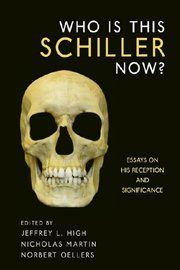Book contents
- Frontmatter
- Contents
- Foreword
- Acknowledgments
- List of Abbreviations
- Introduction: Why Is This Schiller [Still] in the United States?
- Part I Schiller, Drama, and Poetry
- Part II Schiller, Aesthetics, and Philosophy
- Part III Schiller, History, and Politics
- 12 Schiller und die Demokratie
- 13 God's Warriors, Mercenaries, or Freedom Fighters? Politics, Warfare, and Religion in Schiller's Geschichte des Dreyßigjährigen Kriegs
- 14 Who Is This Black Knight? Schiller's Maid of Orleans and (Mythological) History
- 15 Religion and Violence in Schiller's Late Tragedies
- 16 So Who Was Naive? Schiller as Enlightenment Historian and His Successors
- Part IV Schiller Reception — Reception and Schiller
- Part V Schiller Now
- Notes on the Contributors
- Index
15 - Religion and Violence in Schiller's Late Tragedies
from Part III - Schiller, History, and Politics
Published online by Cambridge University Press: 05 February 2013
- Frontmatter
- Contents
- Foreword
- Acknowledgments
- List of Abbreviations
- Introduction: Why Is This Schiller [Still] in the United States?
- Part I Schiller, Drama, and Poetry
- Part II Schiller, Aesthetics, and Philosophy
- Part III Schiller, History, and Politics
- 12 Schiller und die Demokratie
- 13 God's Warriors, Mercenaries, or Freedom Fighters? Politics, Warfare, and Religion in Schiller's Geschichte des Dreyßigjährigen Kriegs
- 14 Who Is This Black Knight? Schiller's Maid of Orleans and (Mythological) History
- 15 Religion and Violence in Schiller's Late Tragedies
- 16 So Who Was Naive? Schiller as Enlightenment Historian and His Successors
- Part IV Schiller Reception — Reception and Schiller
- Part V Schiller Now
- Notes on the Contributors
- Index
Summary
Schiller's late tragedies display “reality as a deficiency.” According to the poetological scheme of Ueber naive und sentimentalische Dichtung (On the Naive and Sentimental in Literature, 1795–96; 1800), the principle for representation would be called “satirical.” Historical and factual reality is drawn into the perspective of “criticism.” This concerns not only the reality of the political, but also that of the religion, in this case Christian. The two spheres are interwoven in Schiller's work to their mutual disadvantage — and both are treated with a cold view in Maria Stuart (Mary Stuart, 1800) and Die Jungfrau von Orleans (The Maid of Orleans, 1801). For all his sympathy for his heroines, the author never strays from his psychological- analytical course: power and drive, eros and aggression dominate the characters and the (battle) field in which they act. The “empirical psychology” of these two dramas, and that of Schiller's time in general, is advanced and radical; while looking back at Montaigne and La Rochefoucauld, it also points forward to Nietzsche and Freud.
AS EXPECTED, MUCH WAS SAID at the Schiller symposiums in the double anniversary years of 2005/2009 about the poet of freedom, hope, courage, and revolts, in a word, about Schiller the idealist. However, it has recently become more widely known that Schiller was also very much a realist, not only as a poet but also as a thinker. He was already a realist as a young man, a trained physician, anthropologist, and psychologist who was keenly familiar with the mechanisms of human behavior, and particularly with its emotional and impulsive nature.
- Type
- Chapter
- Information
- Who Is This Schiller Now?Essays on his Reception and Significance, pp. 247 - 270Publisher: Boydell & BrewerPrint publication year: 2011



